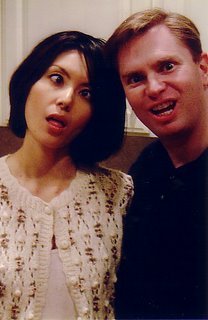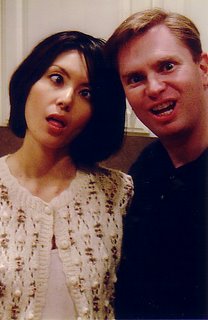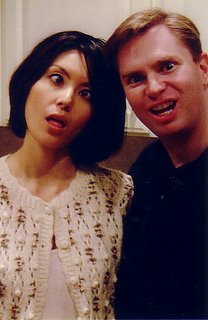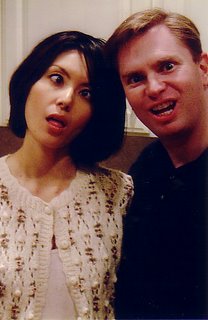John Calvin’s Doctrine of the Church (I)
 Mrs. Tickle’s Tickle
Mrs. Tickle’s TickleThe Friday, February 24th edition of The Wall Street Journal (Taste section, W13) carried an article by Dave Shiflett entitled “Getting Hip to Religion.” Mr. Shiflett recently authored a very interesting book called Exodus: Why Americans Are Fleeing Liberal Churches for Conservative Christianity.” In the Introduction to his book, Shiflett draws our attention to a little known truth: the so-called “progressive” churches are actually losing ground.
He points out that the “pastors” (sorry, I just could not get past including the quotation marks!) of the progressive churches might preach sermons that are “brilliant, and to their minds highly relevant, as they take up the most contentious subjects of the day: war and peace, homosexuality, economic justice, the importance of recycling. Yet they have made a profound miscalculation. Most people don’t go to church to learn the minister’s opinions on whatever happens to be in the headlines. They can get similar opinions sitting on their sofas watching television, quite possibly presented by someone much better-looking.”[1]
He continues, “Central to conservative church success…is commitment to creed.”[2] Moreover, it appears “that a primary reason progressive churches continue to lose members is that they increasingly resemble social service agencies.”[3] I would add to that: resembling bars, night clubs, and Universal Unitarian churches. So where does Mrs. Tickle enter into the equation? Shiflett’s WSJ article mentions author Phyllis Tickle, who has given us the “profound thought of the day”: “Every 500 years the church has a giant rummage sale.” The context of this piece of brilliance is Mrs. Tickle’s (fickle) conviction that “Christianity is in the midst of a new Reformation that will radically remake the faith.”
Don’t you just love it when you know intuitively that you’re standing in the presence of such a prophetic voice? An alternative to Fickle Tickle’s prognosis is this: If evangelicalism doesn’t wake up—right now!—its current downward spiral will so radically remake the faith that it will no longer be called Christian faith. Mr. Tickle must be very proud. Mrs. Tickle informs us that “back in the day” church “was the place where you went to engage God.” No longer. The emerging church is dedicated to getting rid of that notion. “All space is sacred, including bars, coffee houses and parks where the new faithful gather.” So if you’re frequenting a house of ill repute, according to the emerging church, you’re in sacred space. The same could be said for visiting a porn shop, snorting coke, or shooting up heroin. It’s all good. As you might guess, there is no seminary system in place to otherwise educate the “new Reformation” adherents but that is a badge of honor for leaders of the ECM like Brian McLaren, who likes to flaunt the fact that he never attended seminary and he is not a theologian. His writing bears him out about the seminary part; he is, however, a theologian. In his case, he’s a theologian, just a bad one.
What does this emerging church that Mrs. Tickle is describing look like? The 247 Connection Church in Hickory, NC bills itself as “connected, creative, fun, relevant and relational.” It suggests that you bring your laptop to “worship” (again, I just could not resist the quotation marks!) and send instant messages to the “speaker” as he (or I suppose she) addresses the tribe. Mrs. Tickle explains that one of the distinct advantages of the emergent (emerging) churches is that there is no “apparent pulpit envy.” What? Pulpit envy? That’s about as clear as coveting someone’s humility.
But Mrs. Tickle has an answer to the pulpit envy question. You see, the “new Reformation” is not so much into “doing church” through sermonizing as it is through song, dance and visual aids—the “cultural patois of the day.”[4] How quaint. Two pastors who serve “churches” in Minneapolis and Chicago claim that young people with artistic talent, especially those with gifts of dance, spoken word, or art with the spray can are vital to the worship experience.
Mrs. Tickle is exuberant. Rather than looking at the emerging church as Religion Lite she contends that it is just the opposite. I quote: “This is religion like it hasn’t been lived in 300 years.” She’s right. Tickle also claims that these young people “are going back to a religion that costs them something. (What we’re not sure, but we do know that acrylic spray paint isn’t cheap—RG.) In many ways they are going back to first century Christianity.” Are they though?
Mrs. Tickle, Brian McLaren, and a number of the Emergent Church lesser lights do not tire of attempting to convince us that Mrs. Tickle is not shooting us a crooked arrow, but some, who have an IQ in the double digits are not convinced. But rather than poking fun at Mrs. Tickle, Anne Lamott, and the Emergent Church Movement in general, I want to move on to something substantially more in keeping with proper worship of God. Mrs. Tickle believes that “Church was the place you went to engage God,” while orthodox Christianity affirms that church is the place where you go merely to worship God according to his ways.
The Church has never been nor was it ever meant to be a loose aggregate of “artistic” people running around instant messaging the “speaker” or spray painting the premises, but rather a gathering of God’s people intent on worshipping the Lord God Almighty in spirit and truth. Instead of meeting in a “sacred” bar and drinking sanctified beer as part of worship and spray painting the bathroom, biblical worship is supposed to be covenantal.
We are not to come together to do what is good in our own eyes, but rather our worship is to according to the plan and outline given to us by the Lord in Holy Scripture. Therefore, I’m turning to the real giants in the history of the Church. As a Protestant, my short list includes men like Calvin, Bullinger, Bucer, Edwards, Hodge, Bavinck, Kuyper, Warfield and many others. I have singled out Calvin for a number of reasons, not the least of which is that he stands at the head of the “old Reformation” along with men like Luther.
Honestly, I am weary of listening to the arrogant drivel that emanates from the “talks” and writings of the leaders of the emerging church. Rather than constantly pointing out where they are wrong on Scripture, women, homosexuality, Open Theism, a reckless ecumenism, and a number of other areas, I’ve decided to go to work in a more positive and hopefully more edifying manner. So let’s now turn our attention to John Calvin (1509-1564).
The Church and the Holy Spirit
As I visit a number of “blog” sites, it’s evident that there is a great deal of confusion about precisely what the Church of Jesus Christ is and how God’s covenant people are to conduct themselves in weekly corporate worship as well as in their daily lives as Christians. I’m going to begin this issue by taking a look at the first edition of Calvin’s Institutes that appeared in 1536.
As we start out it might be helpful to take a look at how Calvin organized the first edition. This is essential, because the later and final editions followed the same format. The structure of the 1536 edition is as follows: A letter of dedication to Francis I, King of France; a section on the Law (Ten Commandments); an explanation of the Apostles’ Creed; discourse on the Lord’s Prayer; the Sacraments of Christ’s Church; an identification of the Five False Sacraments of the Roman Catholic Church; and a final section on Christian Freedom, Ecclesiastical power, & Political administration.
For our purposes, we want to focus on Calvin’s exposition of the Apostles’ Creed, especially what he said about the heads of doctrine treating the Church of our Lord. What is the holy catholic church? According to Calvin, it is “the whole number of the elect, whether angels or men (Eph. 1:9-10; Col. 1:16); of men, whether dead or living; of the living, in whatever lands they live, or wherever among the nations they have been scattered—to be one church and society, and one people of God.”[5]
Reiterating this point Calvin states, “Now this society is catholic, that is, universal, because there could not be two or three churches.”[6] At this juncture we need to pause and take due note that for Calvin there is but one Church. We are in the habit of speaking of the various denominations and a plurality of churches. Calvin chose to concentrate on the truth that since the beginning of time God has had but one Church. How is that Church to be identified? Calvin answers that question by directing our attention to the important, indispensable role that the members of the Church play.
Who are the members of this one church? I’m convinced that his words will sound strange to our ears: “But all God’s elect are so united and conjoined in Christ (cf. Eph. 1:22-23) that, as they are dependent on one Head, they also grow together into one body, being joined and knit together (cf. Eph. 4:16) as are the limbs of one body (Rom. 12:5; 1 Cor. 10:17; 12:12, 27). These are made truly one who live together in one faith, hope, and love, and in the same Spirit of God, called to the inheritance of eternal life.”[7]
The notions of God’s electing grace and the covenant of grace are inextricably tied together. I’m not identifying the two, but surely worship must be covenantal. Granted that there are tares among the wheat, this does not diminish the concept that biblical worship and ethics are covenantal. In other words, “The covenant is between God and his whole people, but its moral implications affect every individual. In fact, your distinction between personal and social ethics is not always appropriate or helpful in biblical ethics for personal ethics are ‘community shaped’…”[8] This is a far cry from a “everybody-bring-your-spray-paint-can” or dance or send an instant message or something else mentality. There are individuals present in Calvin’s understanding of the Church but not individualism.
According to Calvin, this church is also holy “because as many as have been chosen by God’s eternal providence to be adopted as members of the church—all these are made holy by the Lord (John 17:17-19; Eph. 5:25-32).”[9] To his mind, the Church was quite different from the world and its ways. Election, adoption into the family of God, and sanctification are found in a true church of Jesus Christ. In Paul’s understanding of the Church we’re given a description of “the children of God in such a way that they can be recognized by us…”[10]
This definition should give the modern Church reason to reflect upon its life and lifestyle. It never ceases to amaze me that out of one side of its mouth modern evangelicalism bemoans the rampant secularization and immorality of and in our nation and the world, all the while dressing, acting like, speaking like, and generally mimicking secular society out of the other side of its mouth. You really cannot have it both ways. Statistic after statistic reminds us that the lifestyles of modern Christians are about on par with their secular, non-believing counterparts.
What Calvin is advocating is a distinctively Christian lifestyle that comports with the revealed will of the Lord found deposited in the Word of God. For the longest time the modern Church has trifled with the truth contained in Scripture and flirted with the ways of the world. We are now reaping the whirlwind. We have at least two generations—at least two—that are blatantly ignorant of the contents of Scripture. This is due in part from a lack of pursuit of holiness on the individual Christian’s part as well as from the “pastors” fearing the smiles and/or frowns of the congregation.
Since the Church is the people of God’s elect their salvation rests on a sure and solid bed. How is this “bed” to be described? Calvin gives us four “pillars” of our faith as members of Christ’s church:
First, it stands with God’s election, therefore it cannot fail (Rom. 11:29).[11] It is at this point that we can clearly observe Calvin’s reliance on the true sovereignty of God for our entire salvation. The salvation of those who are truly members of the Church is anchored in God’s electing grace.
Second, those whom the Lord has chosen, have been turned over to the care and keeping of Christ (John 6:39ff.).[12] In a very pastoral fashion Calvin moves from the truth of the doctrine of election to both our union with our Savior as well as the Person and Work of the Holy Spirit. Put briefly, economically: the Father creates, the Son redeems, and the Holy Spirit sanctifies. When God’s elect receive Christ by the instrument of faith they are turned over to his care and keeping. But the risen and ascended Christ is, according to his humanity, now at the right hand of the Father in heaven. How are we to be cared for and kept by one who is so far away? Calvin answers this in terms of the Holy Spirit who is the link (Latin: vinculum) between the believer and his or her Savior. Both in Word and in sacrament it is the work of the Spirit to take everything from the risen and ascended Lord and to impart that to our hungry and thirsty souls unto eternal life. Election works itself out in faith, which involves being turned over to Christ for his care and keeping, as well as being entrusted into the Spirit’s care and keeping for sanctification. These concepts will reappear repeatedly in the 1559 edition of the Institutes.
Third, there was no time from the creation of the world when the Lord did not have his church upon the earth, also there will be no time, even to the end of the age, when he will not have it, because he so promises (Joel 3:20; Ps. 89:27, 35-37; 132:12-18).[13] God’s Church has always existed according to the pattern he has prescribed. The existence of the Church in perpetuity depends upon the sure, certain promises of God fulfilled in Christ. As bad as Adam’s sin was, the Lord sanctifies some unto honor out of the corrupted, vitiated, and polluted mass.[14]
Fourth, “if we are so to believe the church that, relying upon the faithfulness of divine goodness, we hold for certain that we are a part of it, and with the rest of God’s elect, with whom we have been called and already in part justified, let us have faith we shall be perfectly justified and glorified.”[15] The specific, particular promise Calvin has in mind here is this: God will recognize as his sons those who have received his only-begotten Son [Jn. 1:12].[16]
He elaborates on what he means by this when he says, “When, therefore, we have found in Christ alone the good will of God the Father toward us, life, salvation, in short, the very kingdom of heaven itself, he alone ought to be more than enough for us. For this we must ponder: that utterly nothing will be lacking to us which can conduce to our salvation and good, if he is ours; that he and all things of his become ours, if we lean in sure faith upon him, if we rest in him, if we repose in him salvation, life, in sum, all our possession, if we rest assured that he is never going to forsake us. For with ready hands he gives himself to us only that we may receive him in faith.”[17]
What Calvin is talking about in the 1536 edition remains an integral part of all of the other editions of the Institutes. Discussing the nature of the union of the believer with Christ in 3.11.10 Calvin states, “…I confess that we are deprived of this utterly incomparable good until Christ is made ours. Therefore, that joining together of Head and members, that indwelling of Christ in our hearts—in short, that mystical union—are accorded by us the highest degree of importance, so that Christ, having been made ours, makes us sharers with him in the gift with which he has been endowed. We do not, therefore, contemplate him outside ourselves from afar in order that his righteousness may be imputed to us but because we put on Christ and are engrafted into his body—in short, because he deigns to make us one with him.”[18]
Any discussion concerning the nature of Christ’s Church must, by necessity, involve a discussion of the mystical union of the believer with Christ. This is a far cry from the Mysticism that was rampant during the Middle Ages and is making a come back at the front end of the 21st century.[19] Rather, the mystical union of the believer with Christ entails the entirety of our salvation. The late John Murray once wrote, “Nothing is more central and basic than union and communion with Christ.”[20] Thus, the new life (2 Cor. 5:17) does not entail copying the world and its ways or even “engaging the culture” in a way that is not clearly prescribed by Scripture. The new life has both its inception and continuation in Christ.[21] This was Calvin’s idea as well. He did not expect that everyone—head-for-head—in any given local congregation was saved, but he did expect that each of those congregations should act like Christians and live according to God’s requirements in the Church for which Jesus Christ shed his precious blood. In our next issue we shall continue to see the roles of faith and the Holy Spirit in Christ’s Church.
[1] Dave Shiflett, Exodus, (NY: Sentinel, 2005), p. xii.
[2] Ibid., xvii.
[3] Ibid., xvi.
[4] For most of my friends who are not acquainted with the word, patois (păt’ wä) means, “A dialect; hence, illiterate or provincial speech, jargon, cant.” For most of my friends I should point out that “cant” does not mean cannot.
[5] John Calvin, Institution of the Christian Religion, (Ford Lewis Battles [trans.]), (Atlanta: John Knox Press, 1975), p. 78.
[6] Ibid.
[7] Ibid., 78-79.
[8] Christopher J.H. Wright, Walking in the Ways of the Lord, The Ethical Authority of the Old Testament, (Downers Grove, IL: InterVarsity Press, 1995), p. 25.
[9] Calvin, Inst. (1536), 79.
[10] Ibid., 80.
[11] Ibid.
[12] Ibid.
[13] Ibid.
[14] Ibid.
[15] Ibid.
[16] Ibid., 81.
[17] Ibid.
[18] John Calvin, Institutes of the Christian Religion, (John McNeill [ed.] & Ford Lewis Battles [trans.]), Vol. I, (Philadelphia: The Westminster Press, 19674), pp. 736-737.
[19] For two very informative and enlightening descriptions of Mysticism see Charles Hodge, Systematic Theology, Vol. I, (Grand Rapids: Eerdmans, 1965), pp. 61-103, especially pp. 76ff. where Hodge delineates the pantheistic tendency of Mysticism that is being found in more and more “emerging” or “emergent” churches and John L. Girardeau, Discussions of Theological Questions, (Harrisonburg, VA: Sprinkle Publications, 1986), pp. 125-156.
[20] John Murray, Redemption Accomplished and Applied, (Grand Rapids: Eerdmans, 1955), p. 161.
[21] Ibid., 163.






